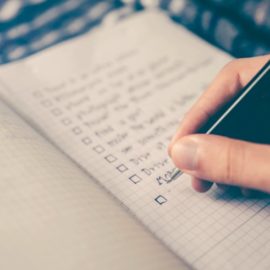

This article is an excerpt from the Shortform book guide to "How to Become a Straight-A Student" by Cal Newport. Shortform has the world's best summaries and analyses of books you should be reading.
Like this article? Sign up for a free trial here.
Do you need to know how to ace tests? What is the key to getting a good grade on a test?
If you want to get the highest grade possible on a test, you’ll have to study for it. Having a consistent study schedule is essential for taking a test—especially if it’s a big part of your grade.
Check out Cal Newport’s tips for acing tests from his book How to Become a Straight-A Student.
How to Study Outside of Exam Periods
Newport contends that if you want to learn how to ace tests, you must go to all your classes throughout the school year—not just when you have an exam. By doing so, you’ll gain a better understanding of the material and thus spend less time outside of class studying for your tests. (Shortform note: Despite Newport’s contention that attending lectures helps you learn, many students skip class because they don’t think the lectures are helpful.)
Moreover, you need to work on your assignments every day—moving ahead on the syllabus if necessary—so you avoid exhausting yourself on a single day because you have too much work to do. (Shortform note: Spacing out your assignments may also help you master the material better due to the spacing effect: Our brains learn information better when we space it out over a longer period.)
However, Newport contends that the specific ways you prepare for and pay attention during lectures depend on what type of class you’re in, specifically for humanities and STEM courses.
How to Prepare for Exams
You now know how to behave throughout the semester so that you’re prepared for your tests—but how should you study for tests once they’re announced? Here, we’ll present Newport’s step-by-step system for ensuring you ace any test.
According to Newport, the first step is to collect your study materials for your exam. For a humanities course, first collect all the relevant notes and divide them into sections by subject. Then, create a practice quiz for each section using the questions in your notes, ensuring that each quiz covers all the relevant material. For a STEM course, collect all the relevant problem sets, plus one sheet of paper per problem set with the sample problems from the relevant lecture. You should also create questions that ask you to explain the fundamentals of any major topic addressed by the problem set.
(Shortform note: Other academic experts recommend creating a study guide based both on your lecture notes and your textbook. This technique is designed for STEM classes but can also be used for humanities classes that rely on a single textbook. To practice it, first review the table of contents of your textbook. Then, write down every heading from every section that you’ll be tested on. Finally, summarize the content of every section (using both the text and all relevant notes) to create your guide.)
The second step is to review your study materials. These review days should be spaced out and begin at least a day after you collect your study materials to avoid fatiguing your brain. Newport specifically recommends that you test yourself in rounds. First, answer every question in your study guide. Write down or speak these answers aloud. If you struggle, write a checkmark next to the problem. Once you’ve finished the first round, take a break—then review only the problems you wrote a checkmark next to. Keep repeating this until you stop adding checkmarks.
Third, you must gain a baseline understanding of anything you’re still confused about. As Newport notes, during your collection and review process, you’ll likely come across concepts you never quite mastered. This can be dangerous: For example, if a concept you’re unclear on is the basis of a problem worth 50% of your exam, you’ll tank your grade. Therefore, clear up confusion quickly before the exam by talking to your professors and classmates.
(Shortform note: If you’re still lost regarding a particular concept after speaking with your professors and classmates, consider looking it up on the internet. Wikipedia is a good starting point; you should also consider educational YouTube channels that can both help you understand concepts you’re unclear on and refine your understanding of ones with which you are familiar.)
How to Take Tests
With all the preparation you’ve done to learn how to ace tests, you’re now ready to follow Newport’s strategies for taking the test efficiently and acing the exam. Once you receive the exam, first read all the questions to gain an idea of what the exam will be like. Then, subtract 10 minutes from the total exam time and divide the remainder by the number of questions to determine how long you should spend on each question.
Next, start answering questions from easiest to hardest to ensure you get the points for the answers you definitely know before struggling with questions you’re not sure about. Keep an eye on the clock as you do so, moving on if you’re spending too much time on a particular question. Finally, once you finish, take any time remaining to review and polish your answers so you can turn in the best possible version of your exam.

———End of Preview———
Like what you just read? Read the rest of the world's best book summary and analysis of Cal Newport's "How to Become a Straight-A Student" at Shortform.
Here's what you'll find in our full How to Become a Straight-A Student summary:
- How to ace your college courses with just a few hours of studying each day
- How to combat procrastination and write better papers
- Study methods to prepare for different types of exams







GREAT ARTICLE.
I Think having the right study environment, which should be quiet, comfortable and, free from distractions. It also suggests some creating a study schedule and breaking up study sessions into shorter, more manageable periods of time to improve focus and prevent burnout.